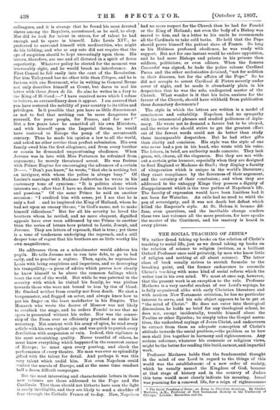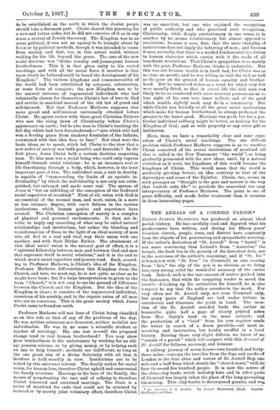THE SOCIAL TEACHING OF JESUS.* WE rather dread taking up
books on the relation of Christ's teaching to social life, just as we dread taking up books on the relation of science to religion (written, as a brilliant Oxford Professor once said privately, by men who know little of religion and nothing at all about science). The latter class of book usually strives to stretch formulas to the breaking point, and the former endeavours to reconcile Christ's teaching with some kind of social reform which the writer has in his own mind. We must at once say, however, that the present work is an exception to the rule. Professor Mathews is a very careful student of our Lord's sayings, he is fully acquainted alike with early Christian literature and with modern New Testament criticism, he has no particular interest to serve, and his sole object appears to be to get at " the mind of Christ." He does not enter into theological discussions, he holds no brief for any theological school, he does not, except incidentally, trouble himself about the Pauline or other Epistles; he simply takes the Gospel narra- tives, the undoubted sayings of Jesus Christ, and endeavours to extract from them an adequate conception of Christ's attitude towards the social problem,—the problem as to how men shall live together in harmony and righteousness. Any serious reformer, whatever his economic or religious views, might be the better for reading this lucid,earnest, and impartial work.
Professor Mathews holds that the fundamental thought in the mind of our Lord in regard to the things of this world was the establishment of a new order of society, which he usually named the Kingdom of God, because at that stage of history and in the country of Judaea this term would most clearly indicate his meaning. Israel was yearning for a renewed life, for a reign of righteousness
• The Social Teaching of Jesus : an Essay in Christian Sociology. By Sheller Mathews, A.M., Professor of New Testament History in the University of Chicago. London: Macmillan and Co.
to be established on the earth in which the Jewish people should take a foremost part. Christ shared this yearning for a new and better order, but he did not conceive of it as in any sense a revival of Jewish theocracy. The Kingdom was in no sense political, it was not an agency to be brought shoat by force or by political methods, though it was intended to trans- form society, and that, too, in this actual world, without waiting for the life beyond the grave. The core of the new social doctrine was "divine sonship and (consequent human brotherliness. This it is that gives unity to his varied teachings, and with all the moral force it involves is that upon which he believed could be based the development of his Kingdom." The various kingdoms and commonwealths of the world bad been established by conquest, colonisation, or some form of compact; the new Kingdom was to be the natural outcome of regenerated individuals who had voluntarily chosen for themselves Christ's law of love to God and service to mankind instead of the old law of greed and self-interest. Not that Professor Mathews supposes that mere greed and self-interest universally obtained before Christ. He agrees rather with those great Christian Fathers who saw the rising dawn of Christianity before Christ's appearance on earth ; but he also sees in Christ's teaching the fall day which bad been foreshadowed,—" arts which still had won a fleeting grace from shadowy fountains of the Infinite, communed with that idea face to face." But what were the basic ideas, so to speak, which led Christ to the view that a new order of society was both possible and desirable ? In the first place, Jesus Christ held a certain doctrine respecting man. To him man was a social being who could only express himself through social relations : he is an incarnate soul or life functioning through a body, which, however, is the least important part of him. The individual man, a unit in duality, is capable of "transcending the limits of an egoistic in- dividuality," by which the individuality is not only not extin- guished, but enlarged and made more real. The system of Jesus is " but an unfolding of the conception of the Godward social capacities of mankind." First of all, union with God is an essential of the normal man, and next, union, in a more or less intimate degree, with one's fellows in the various institutions which human genius and experience have created. The Christian conception of society is a complex of physical and personal environments. It does not in- volve or imply any cancelling of what may be called natural• relationships and institutions, but rather the blending and transformation of these in the light of an ideal society of men who all feel in a real and vital way their union with one another, and with their Divine Father. The attainment of this ideal social union is the natural goal of effort, it is a " spiritual fellowship between men and between God and men that expresses itself in social relations," and it is the end to which man's social capacities and powers tend. Such, accord- ing to Professor Mathews, is Christ's idea of the Kingdom. Professor Mathews differentiates this Kingdom from the Church, and here, we must say, he is not quite so clear as he might have been; for, if a large interpretation be given to the term " Church," it is not easy to see the ground of difference between the Church and the Kingdom. But the idea of the Kingdom is clear ; it consists of the regenerated individual, conscious of his sonship, and in the organic union of all men who are so conscious. This is the great society which Jesus Christ came to found on earth.
Professor Mathews will not hear of Christ being classified as on this side or that of any of the problems of the day. He was neither aristocrat nor democrat, neither socialist nor individualist. He was in no sense a scientific student or teacher of sociology. His one test is—will the proposed change tend to real human brotherhood ? You may show your brotherliness to the unfortunate by working for an old- age pension scheme, or by giving money, or by helping such an one to help himself ; methods are indifferent, so long as the one great aim of a divine fraternity with all that it involves is held steadily in view. Institutions are to be tested by this universal solvent. The family makes for social union, for human love, therefore Christ upheld and consecrated the family relations. Marriage is the base of the family, the means of perpetuating the race and of refining it, therefore Christ honoured and sustained marriage. The State is a union of mankind for ends that could not be attained by isolated or by merely joint voluntary effort, therefore Christ was no anarchist, but one who enjoined the recognition of public authority and who practised such recognition. Christianity, while deeply revolutionary in one sense, is in another by no means revolutionary, but almost opposed to revolution ; because it sees, first, that the mere changing of institutions does not imply the bettering of men ; and because it sees, secondly, that there is a needed fundamental revolution in human character which carries with it the seeds of all beneficent revolutions. That Christ's sympathies were mainly with the poor, Professor Mathews thinks is undeniable. But this was not because wealth is in itself bad, for Christ was at no time an ascetic, and be was willing to visit the rich as well as the poor on the ground of human equality and brother- hood. But he conceived riches as a trust for which very few were morally fitted, so that in actual life the rich man was likely to be so cumbered with mere material possessions as to lose sight of his own true inner welfare and of the good which wealth, rightly used, may do in a community. But while Christ was friendly to all the great social institutions which make for human brotherhood, he always preferred the greater to the lesser good. Marriage was good, but for a par- ticular individual celibacy might be better, as making for the Kingdom of God ; and so with property or any other gift or institution.
Here, then, we have a remarkably clear and sane expo- sition of Christ's social teachings. The one difficult problem which Professor Mathews suggests is as to whether Christ conceived of the actual institutions of mankind (all that is called in the New Testament " the world ") as being gradually permeated with the new ideas, until, by a natural evolution as it were, the kingdoms of this world became the kingdoms of Christ. This would mean that the world is gradually growing better; an idea contrary to that of the Apocalypse and some of the Epistles. Christ, too, seems in such passages as " Straight is the gate and narrow is the way that leadeth unto life" to preclude the somewhat too easy interpretation of Professor Mathews. The point is one of great difficulty, and needs fuller treatment than it receives , in these interesting pages.







































 Previous page
Previous page